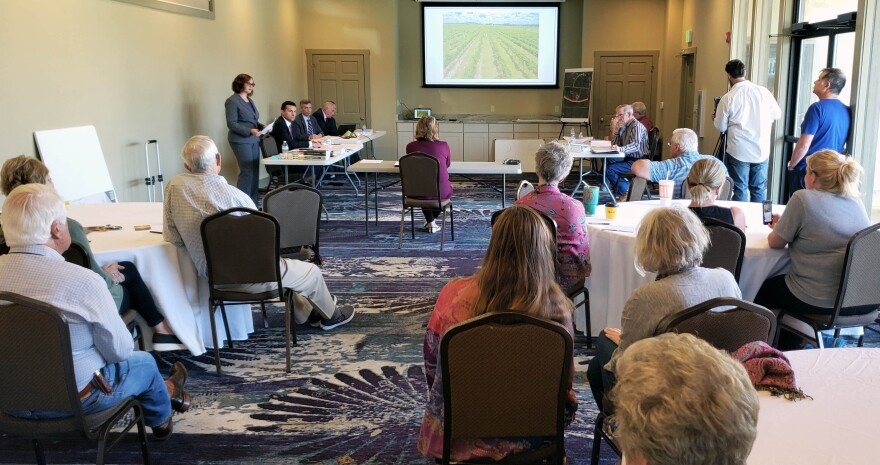Kay Pence owns a ranch in the Hill Country town of Fredericksburg. About a year ago, she got a call from the pipeline company Kinder Morgan. The caller told her the company planned to run a section of its 430-mile Permian Highway natural gas pipeline through her property. Pence didn’t like that.
“This is going to sound overreactive, but you felt violated,” Pence says. “They have access to your property, and there was nothing you could do.”
In Texas, pipeline companies have the power of eminent domain. That means they can take private land even if the landowner doesn’t want to sell. The company only needs to pay a fair price. Companies say this allows them to build the infrastructure necessary to move oil and gas.
But a fair price can be hard to settle on.
“You have property in the Hill Country that is fifth generation and their property is being cut in half,” Pence says. “Their property is ruined.”
Now, as building starts on the pipeline, some landowners are rejecting Kinder Morgan’s offers and winning awards vastly greater through a legal process called a condemnation hearing. It’s a unique proceeding where three local volunteers appointed by a district judge hear arguments about the land's value and make a decision.
In Pence’s case, an offer of $45,000 for a 3-acre strip of land turned into an award of $1.2 million after the hearing. In Blanco County, a landowner who was told by Kinder Morgan that his land was worth $20,000 was awarded $1.3 million. Another landowner in Gillespie County turned an offer of $85,000 into an $11 million award.
Kinder Morgan has appealed some of the awards. But pipeline opponents are pointing to the results of these hearings as evidence the company is undervaluing Hill Country land.
Some also see this as proof the company is messing with the wrong small towns.
Anatomy Of A Condemnation Hearing
Considering that millions of dollars are at stake, condemnation hearings can feel informal.
Pence’s hearing took place in a small banquet hall in a roadside motel in Fredericksburg. There were kolaches and coffee in the back. The volunteers, known as special commissioners, sat at a table in the front of the room. Dressed in the pressed-Wranglers style of small-town Texas, they faced lawyers in suits representing Pence and Kinder Morgan.
Pipeline companies want to pay just for the land they're going to use; landowners want compensation for the impact to their whole property.
Both parties agree these commissioners have one job: to come up with a number. But that’s where their agreement ends.
The Pences' ranch is 105 acres. The $45,000 the company offered was for a 3-acre strip of land running through the property. The couple believed the ranch to be worth $4 million and thought the offer was all wrong.
“We get one payment and then they own that easement in perpetuity,” Pence says. "They have access to it. They can sell it. They can change product. They can do all sorts of things.”
Pence considered the pipeline’s impact on the price of the whole ranch – how it cuts through the property, allows pipeline workers to come in and out as they please, and limits what can be built. She estimated the value lost on the property would be about $1.8 million.
This happens a lot in these cases: Pipeline companies want to pay just for the land they’re going to use; landowners want compensation for the impact to their whole property.
'Hometowned'
The hearings in Gillespie County have attracted crowds of supporters for local landowners. They worry about the pipeline’s impact on the environment, public safety and property rights.
They also believe Kinder Morgan is either intentionally lowballing landowners or seriously misjudging the value of Hill Country real estate.
“The way it’s going, hopefully, are keep making that price tag go up, up, up, up, up,” says Kevin Booth, a Gillespie County landowner who attended Pence’s hearing. He says trying to assign a fair market value to the land is like trying to place a value on a "quilt your grandmother knitted."
“I heard a rumor that Kinder Morgan lawyers were complaining that they were being 'hometowned,'" says Booth, who has volunteered to serve as a special commissioner. “You came here to a small German community were everybody’s known each other for 120 years and you’re surprised that they’re all communicating?” he says. “Yeah ... so you’re being hometowned.”
Allen Fore, Kinder Morgan’s vice president of public affairs, says he was not aware of company representatives saying anything negative about local commissioner’s courts.
“We respect what [the commissioners] do, but we may not agree with it,” he says. “It’s a process that’s been laid out in state statute and regulation, and that’s the process for Texas so we’re following that process.”
But Pence believes the process could be improved. She says pipeline companies should submit to public oversight in the planning phase of their projects, much the way developers of transmission lines and road projects do.
She says she also believes property owners whose land is taken should get more out of the deal and that regular royalty checks would make the burden of living near pipelines easier to bear.
“If they would do that, and treat the landowner fairly, you wouldn’t get this kind of pushback,” Pence says. “You wouldn’t have all this litigious business going on, because landowners would feel like they are partners in this.”







